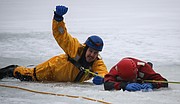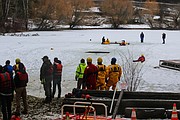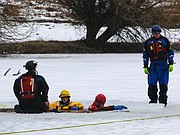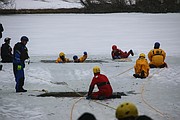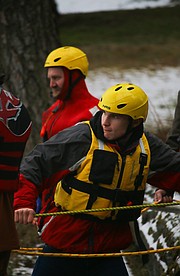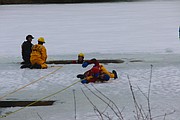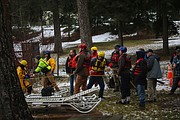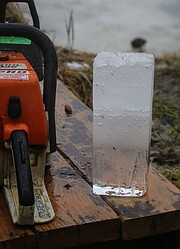North Idaho firefighters train here for ice rescues
NAPLES — Firefighters from three counties and five different districts came together last Saturday to brave the cold and train — on and in — a frozen lake, with the intention of learning and practicing skills that could possibly save lives.
South Boundary Fire, Hall Mountain Fire, North Bench Fire, all from Boundary County, participated in the training event, along with Northside Fire from Bonner County, and Hauser Lake Fire from Kootenai County.
The instructors were South Boundary Fire Chief Tony Rohrwasser and Hauser Lake Fire Captain Gary Mobbs, who is also a member of the Kootenai County Sheriff’s Office Dive Rescue Team, and has been teaching ice rescue training for 16 years.
“Gary is very well trained and an excellent instructor,” said Rohrwasser.
The last minute training came at an opportune time for both instructors. Mobbs had a class planned in his district, but melting ice caused a problem, so he contacted Rohrwasser. With permission from Blue Lake RV Resort, they were able to utilize the small, deep lake that stays frozen longer than most other lakes in the area.
The timing worked out for Rohrwasser as well.
“From conversations with Gary and the State it is my understanding that Gary and myself are the only ones trained through Dive Rescue in the State of Idaho that are left and my term was up if I didn’t participate in a class this year,” said Rohrwasser.
Idaho utilizes the Ice Rescue training curriculum from Dive Rescue International which requires their Instructors to teach a class a minimum of once every three years.
The class began the day before, when the firefighters took part in a four hour classroom training, followed by the hands on training at Blue Lake the next day, where they took turns practicing different rescue roles as well as playing the part of the victims in different scenarios set up by their instructors.
“On the lake many of the participants learned that when a suit leaks in the water in February, it is very cold,” said Rohrwasser. “The Ice Rescue suits which are made up of different materials depending on manufacturer, are also referred to as gumby suits — which for those who remember Gumby and Pokey, the older suits have two finger slots on each hand and a boot that resembles Gumby’s boots.”
Both Boundary and Bonner Counties have many small lakes and creeks that attract people in the winter to skate or fish.
“With temperature fluctuations, these lakes can go from frozen and safe to be on, to very dangerous in a short time,” said Rohrwasser.
Falling through ice is particularly dangerous due to the difficulty of escaping the situation, and quickly dropping body temperature exacerbates the problem.
“A successful rescue requires fast action, agreements and preplanning in place,” said Rohrwasser. “The more trained professionals we have in a county full of volunteer responders, the better chance we have.”
In South Boundary’s district, their ice rescue pre plan includes an immediate call for the dive team, then to Hall Mountain Fire and Northside Fire for personnel with ice rescue equipment, followed by calls to Paradise Valley Fire and North Bench Fire for assistance on the shore crew.
“Training like this through the State ensures we are doing things to a standard and we also get to learn what our partner agencies have in their inventory so we can plan accordingly,” said Rohrwasser.
Rohrwasser was grateful to Blue Lake RV Resort, not only for allowing the firefighters to train at the lake, but also for the use of the clubhouse facilities to warm up and enjoy lunch. They also kept a firepit going so that the firefighters could take a break to warm themselves during the hours of training.
“Thanks to all of the volunteer responders that gave up most of their weekend to study about Ice and jump in the frigid waters,” said Rohrwasser.
Rohrwasser advises that if a person is witness to someone falling in the ice, they should immediately call 911.
“If you can make contact by voice from a safe location, stay in communication with the person until the responders arrive,” he said.
Taking precautions when enjoying the outdoors during all seasons is the best way to stay safe, but in the event that things go wrong, local firefighters are always training and ready to respond to any situation.











